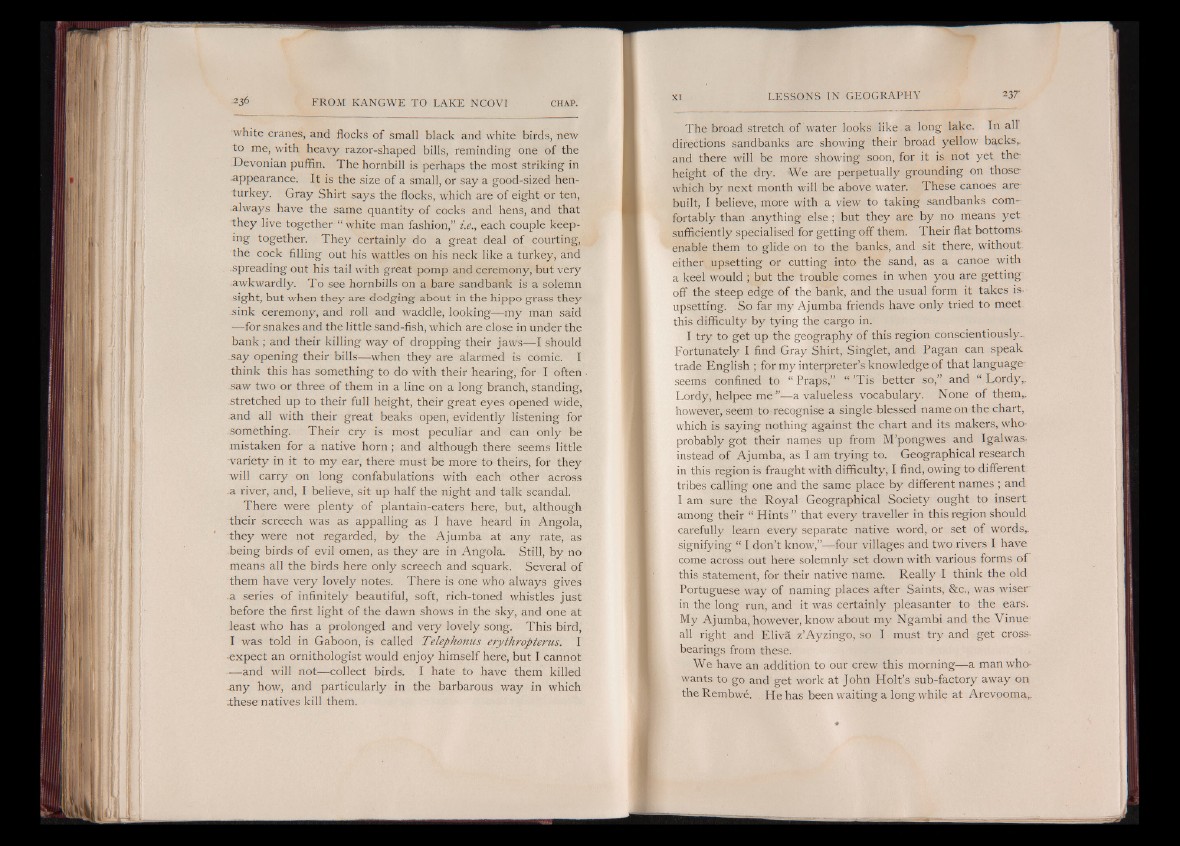
white cranes, and flocks of small black and white birds, new
to me, with heavy razor-shaped bills, reminding one of the
Devonian puffin. The hornbill is perhaps the most striking in
-appearance. It is the size of a small, or say a good-sized hen-
turkey. Gray Shirt says the flocks, which are of eight or ten,
-always have the same quantity of cocks and hens, and that
they live together “ white man fashion,” i.e., each couple keeping
together. They certainly do a great deal of courting,
the cock filling out his wattles on his neck like a turkey, and
spreading out his tail with great pomp and ceremony, but very
-awkwardly. To see horn bills on a bare sandbank is a solemn
sight, but when they are dodging about in the hippo grass they
.sink ceremony, and roll and waddle, looking— my man said
— for snakes and the little sand-fish, which are close in under the
bank ; and their killing way of dropping their jaws— I should
.say opening their bills— when they are alarmed is comic. I
think this has something to do with their hearing, for I often
saw two or three of them in a line on a long branch, standing,
stretched up to their full height, their great eyes opened wide,
and all with their great beaks open, evidently listening for
.something. Their cry is most peculiar and can only be
mistaken for a native horn; and although there seems little
variety in it to my ear, there must be more to theirs, for they
will carry on long confabulations with each other across
.a river, and, I believe, sit up half the night and talk scandal.
There were plenty of plantain-eaters here, but, although
their screech was as appalling as I have heard in Angola,
they were not regarded, by the Ajumba at any rate, as
being birds of evil omen, as they are in Angola. Still, by no
means all the birds here only screech and squark. Several of
them have very lovely notes. There is one who always gives
.a series of infinitely beautiful, soft, rich-toned whistles just
before the first light of the dawn shows in the sky, and one at
least who has a prolonged and very lovely song. This bird,
I was told in Gaboon, is called Telephonus erythropterus. I
•expect an ornithologist would enjoy himself here, but I cannot
•—and will not— collect birds. I hate to have them killed
.any how, and particularly in the barbarous way in which
These natives kill them.
The broad stretch of water looks like a long lake. In all
directions sandbanks are showing their broad yellow backs,,
and there will be more showing soon, for it is not yet the
height of the dry. We are perpetually grounding on those
which by next month will be above water. These canoes are-
built, I believe, more with a view to taking sandbanks comfortably
than anything else; but they are by no means yet
sufficiently specialised for getting off them. Their flat bottoms-
enable them to glide on to the banks, and sit there, without
either upsetting or cutting into the sand, as a canoe with
a keel would ; but the trouble comes in when you are getting-
off the steep edge of the bank, and the usual form it takes is-
upsetting. So far my Ajumba friends have only tried to meet
this difficulty by tying the cargo in.
I try to get up the geography of this region conscientiously^
Fortunately I find Gray Shirt, Singlet, and Pagan can speak
trade English ; for my interpreter’s knowledge of that language-
seems confined to “ Praps,” “ ’T is better so,” and “ Lordy,
Lordy, helpee me ”— a valueless vocabulary. None of them,,
however, seem to recognise a single blessed name on the chart,
which is saying nothing against the chart and its makers, who-
probably got their names up from M’pongwes and Igalwas-
instead of Ajumba, as I am trying to. Geographical research
in this region is fraught with difficulty, I find, owing to different
tribes calling one and the same place by different names ; and
I am sure the Royal Geographical Society ought to insert
among their “ Hints ” that every traveller in this region should
carefully learn every separate native word, or set of words,
signifying “ I don’t know,”— four villages and two rivers I have
come across out here solemnly set down with various forms oF
this statement, for their native name. Really I think the old
Portuguese way of naming places after Saints, &c., was wiser
in the long run, and it was certainly pleasanter to the ears.
My Ajumba, however, know about my Ngambi and the Vinue-
all right and Eliv& z’Ayzingo, so I must try and get crossbearings
from these.
We have an addition to our crew this morning— a man who
wants to go and get work at John Holt’s sub-factory away on
the Rembw6. He has been waiting a long.while at Arevooma,